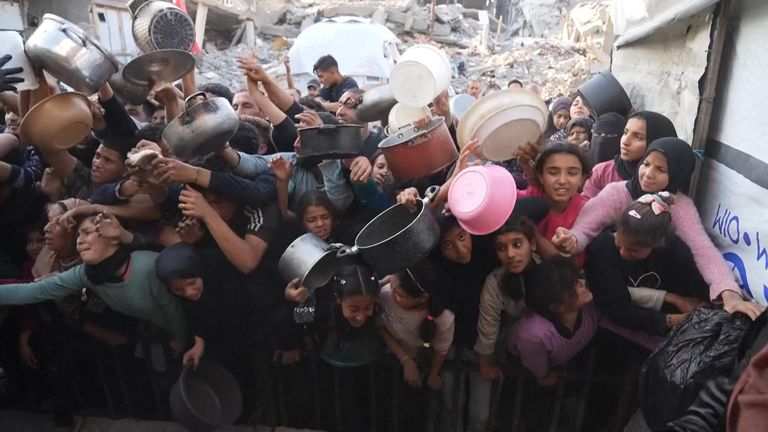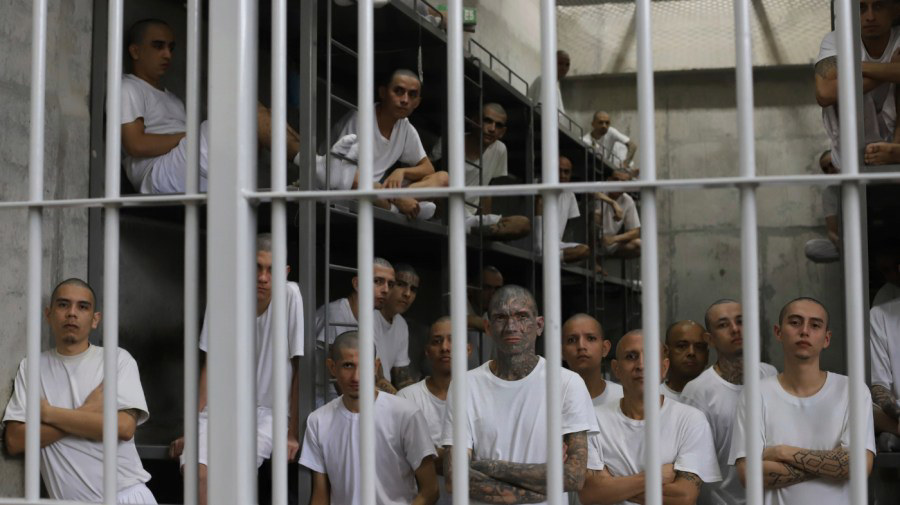Gaza's Plight: The Devastating Impact Of Israel's Blockade

Table of Contents
The Humanitarian Crisis in Gaza
The Gaza blockade has created a profound humanitarian crisis, severely impacting the most basic needs of the population. The consequences of this prolonged siege are visible in every aspect of daily life, from access to food and clean water to the collapse of the healthcare system.
Food and Water Security
The Gaza Strip faces significant challenges in ensuring food and water security. Years of blockade and conflict have severely hampered agricultural production, forcing reliance on imported goods, which are often subject to restrictions and delays.
- Limited agricultural production: The blockade restricts the import of vital agricultural inputs, such as fertilizers and seeds, hindering local farming.
- Reliance on imported goods: Gazans are heavily dependent on imported food, making them vulnerable to price fluctuations and supply disruptions.
- Restrictions on fishing: Fishing zones are severely limited, impacting the livelihoods of many fishermen and reducing a crucial source of protein.
- Water contamination: Years of conflict and limited infrastructure have resulted in widespread water contamination, leading to health problems.
The UN estimates that over 50% of Gaza's population suffers from food insecurity, and malnutrition rates, especially among children, are alarmingly high.
Healthcare System Collapse
Gaza's already fragile healthcare system has been pushed to the brink of collapse by the blockade. Access to essential medicines, medical equipment, and specialized care is severely limited.
- Difficulty accessing specialized medical care: Many Gazans needing specialized treatment are unable to leave the Strip due to restrictions on movement.
- Limited hospital capacity: Hospitals are overcrowded and lack essential resources, hindering their ability to provide adequate care.
- Impact on maternal and child health: Maternal and infant mortality rates are significantly higher in Gaza than in other regions, directly linked to the limitations imposed by the blockade.
Numerous reports from organizations like the World Health Organization (WHO) highlight the critical shortage of medical supplies and the devastating impact on the health of Gazans.
Electricity Shortages and Infrastructure Decay
Chronic electricity shortages plague Gaza, severely impacting daily life and hindering development. Years of conflict and the blockade have resulted in damage to infrastructure, further exacerbating the situation.
- Damage to infrastructure: Power plants have been damaged by repeated conflicts, limiting electricity generation capacity.
- Limited access to clean water: Electricity shortages hamper water pumping and treatment, reducing access to clean water and sanitation.
- Impact on businesses: Businesses struggle to operate due to power outages, affecting productivity and economic growth.
- Overall quality of life: Constant power outages negatively affect all aspects of daily life, from cooking and refrigeration to education and healthcare.
The electricity shortage in Gaza often lasts for over 12 hours a day, severely impacting the already vulnerable population.
Economic Devastation and Unemployment
The Gaza blockade has caused widespread economic devastation, leading to crippling unemployment and poverty. Restricted access to markets and the movement of goods and people has strangled the economy.
Restricted Trade and Movement
The severe restrictions on the movement of goods and people significantly hamper Gaza's economy.
- Limited export opportunities: Gazan businesses struggle to export their products, limiting economic growth and income opportunities.
- High unemployment rates: Unemployment rates in Gaza are among the highest globally, with youth unemployment exceeding 60%.
- Poverty: Poverty rates are exceedingly high, with a large portion of the population relying on humanitarian aid for survival.
- Dependence on foreign aid: Gaza's economy is heavily reliant on foreign aid, making it vulnerable to fluctuations in international support.
Impact on Small Businesses and Entrepreneurship
The blockade has disproportionately impacted small businesses and entrepreneurs in Gaza.
- Lack of raw materials: Businesses struggle to access essential raw materials needed for production.
- Restricted access to markets: Limited export opportunities and restrictions on movement hamper sales and distribution.
- Limited credit availability: Access to credit and financial services is severely restricted, hindering business growth and expansion.
Many small businesses have been forced to close, leading to further job losses and economic hardship.
The Psychological Impact of the Blockade
The ongoing blockade and repeated conflicts have had a devastating impact on the mental health of Gazans. The constant threat of violence, economic hardship, and uncertainty about the future contribute to a pervasive sense of despair.
Mental Health Crisis
The mental health crisis in Gaza is severe, with rising rates of PTSD, depression, and anxiety.
- Limited access to mental health services: Access to mental healthcare is limited due to a shortage of trained professionals and resources.
- Trauma from past conflicts: The cumulative effect of past conflicts and ongoing tensions has left a deep psychological scar on the population.
- Uncertainty about the future: The uncertain future under the blockade contributes to chronic stress and anxiety.
Impact on Children and Youth
Children and young people in Gaza are particularly vulnerable to the psychological impacts of the blockade.
- Limited educational opportunities: The blockade restricts access to quality education, hindering their future prospects.
- Lack of recreational activities: Limited recreational opportunities restrict their ability to cope with stress and trauma.
- Witnessing violence and trauma: Many children have witnessed violence and trauma, leaving lasting psychological scars.
The psychological well-being of Gaza’s children and youth is critical to the future of the region and requires urgent attention.
Conclusion
The Gaza blockade has resulted in a catastrophic humanitarian crisis, economic devastation, and a profound psychological impact on the population. The consequences are far-reaching and devastating, affecting every aspect of life for Gazans. The severe food insecurity, the collapse of the healthcare system, the crippling unemployment, and the pervasive psychological distress demand immediate action. We must all work towards ending the Gaza blockade, lifting the siege on Gaza, and providing urgent humanitarian aid. The ongoing Gaza blockade demands immediate international attention and concerted action to prevent further suffering and build a sustainable future for the people of Gaza.

Featured Posts
-
 Trumps Attorney General Issues Chilling Threat To Political Rivals
May 10, 2025
Trumps Attorney General Issues Chilling Threat To Political Rivals
May 10, 2025 -
 Us Citizens Sent To El Salvador Prisons Jeanine Pirros Dismissal Of Due Process
May 10, 2025
Us Citizens Sent To El Salvador Prisons Jeanine Pirros Dismissal Of Due Process
May 10, 2025 -
 Chinas Steel Production Cuts Implications For The Iron Ore Market
May 10, 2025
Chinas Steel Production Cuts Implications For The Iron Ore Market
May 10, 2025 -
 A Footballers Resilience From Wolves Rejection To European Dominance
May 10, 2025
A Footballers Resilience From Wolves Rejection To European Dominance
May 10, 2025 -
 Amy Walsh Defends Wynne Evans Following Sexual Slur Allegation
May 10, 2025
Amy Walsh Defends Wynne Evans Following Sexual Slur Allegation
May 10, 2025
